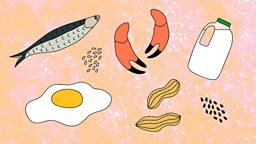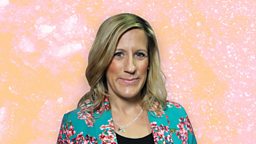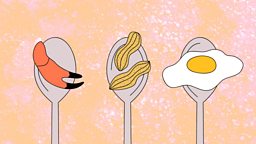Food allergies: What parents need to know

It was the death of 15-year-old Natasha Ednan-Laperouse in 2016 after she’d eaten a baguette containing sesame seeds that highlighted even more strongly how dangerous food allergies can be.
Around three to six percent of children in the developed world are said to suffer and the problem seems to be getting worse.
So what do parents need to know about the diagnosis and management of food allergies in their children?
Speaking on the Woman's Hour parenting podcast, Holly Shaw, nurse advisor for charity Allergy UK, outlined 10 things to be aware of.

1. What is a food allergy?
“A food allergy is the immune system’s response where it recognises that a protein within a food is harmful and produces allergic symptoms as a result of that.
“It’s where the immune system mistakes foods that are normally harmless to most people.”
2. What are the common symptoms of a food allergy?
“Food allergy symptoms can be mild, moderate or severe.
“The most severe expression we call anaphylaxis, the form most parents have the most worry about.
“Mild symptoms can include rashes, red and raised hives that can be itchy.
“It can also include things like swelling to the lips, eyes and face, vomiting, abdominal pain, and diarrhoea.”
3. What foods can cause allergies?
“Common culprit foods in babies and children would include cow’s milk, egg, peanuts, but there are many other foods that children can be allergic to, including tree nuts, fish, sesame, wheat.
“It’s possible to be allergic to most types of foods but in infants, the most common forms are cow’s milk and egg.”
4. What should you do if you suspect an allergic reaction?
“If you suspect your child is having an allergic reaction, seek medical advice.
“It’s always good to have some antihistamines at home in case of an allergic reaction.
“For symptoms that are mild to moderate, antihistamines can help alleviate those symptoms.
“Do speak to a health professional, your GP, or in more urgent cases, you wouldn’t want to delay medical help, so calling 111 or 999.”

5. How can you try and reduce the risk of food allergies?
“Taking good care of infants’ skin. We know that infants who develop eczema in the first few months of life are more likely to be at risk of developing a food allergy.
“Keep the skin moisturised by applying a good quality emollient to the skin.
“Don’t be fearful to introduce common food allergens into the diet in an age appropriate form when your infant is developmentally ready.
“But introduce those foods one at a time. If there is a problem, it’s clear which food is the culprit.”
6. Why do some children get allergies and others don’t?
“We’ve known for a long time that allergies run in families, so there is that genetic, hereditary predisposition.
“But we also understand that the environment a child is exposed to early on in life does shape their allergic journey and pathway. It does determine to some degree which children go on to develop food allergies.
“We do see children whose parents have not had food allergies go on to develop them themselves.”
7. What myth about food allergies should be busted?
“I think the biggest myth to bust about food allergies is that not all reactions to foods are because of food allergy.
“Sometimes it might be because there has been too much of the food eaten or the child isn’t well with another type of illness and they are vomiting because of that.
“Don’t always think that food allergy is a cause, because it might not be.”
8. How can you be prepared if your child has a food allergy?
“Know what the signs and symptoms of an allergic reaction are and how to deal with those symptoms.
“I think communication is so, so important. We eat a lot of times during the day, we snack a lot of times during the day, we eat at home, we eat at school, we eat at childcare. Communicating the child’s allergy to those people that are responsible for the cooking or meal preparations, supervision of those foods, so that other people understand what your child is allergic to, what the signs and symptoms are and what the treatment is for them should they accidentally come across the foods they are allergic to.
“It’s really important that you take with you at all times the allergy medicine.
“Some people are prescribed antihistamines, other people are prescribed adrenaline pens, asthma pumps, so if you are eating out of the home, always make sure the allergy medicines go with you wherever, because you never know when you might stumble across a food allergy accidentally.”

9. Are food allergens on food labels?
“Unfortunately there isn’t a cure for food allergy at this moment in time, so avoiding foods that your child is allergic to is important.
“Part of food avoidance is being able to read and understand food labels, and to look at that label and identify what that food contains.
“There are 14 food allergens that are required by law to be listed on a food label (if they are a food produced within the EU).
“These are often emphasised in bold or in italics which does make it easier for parents to look at the ingredients and make safe food choices for their children.”
10. Why is an action plan important?
“If parents are concerned about sending their child to childcare or nursery, it’s really important that you share with them an action plan.
“This will document the foods your child is allergic to, the allergic symptoms they may experience and what treatments have been prescribed for your child.
“Whether that’s antihistamines, whether it’s a specific type of adrenaline auto-injector.
“It will help educate staff at the childcare facilities as well as giving you some more confidence and reassurance that your child’s allergies can be managed outside of the home.”
More information and advice about food allergies can be found on the and websites.
The Woman's Hour parenting podcast is released every Wednesday.
You can listen to more from Holly Shaw here or you can download the podcast on the ±«Óãtv Sounds app.



